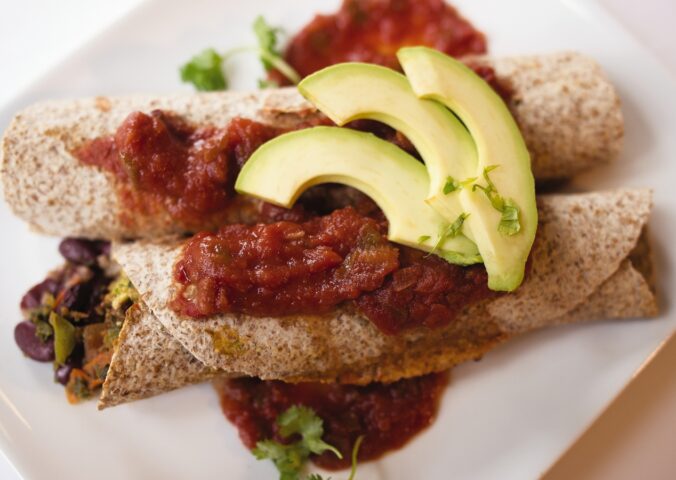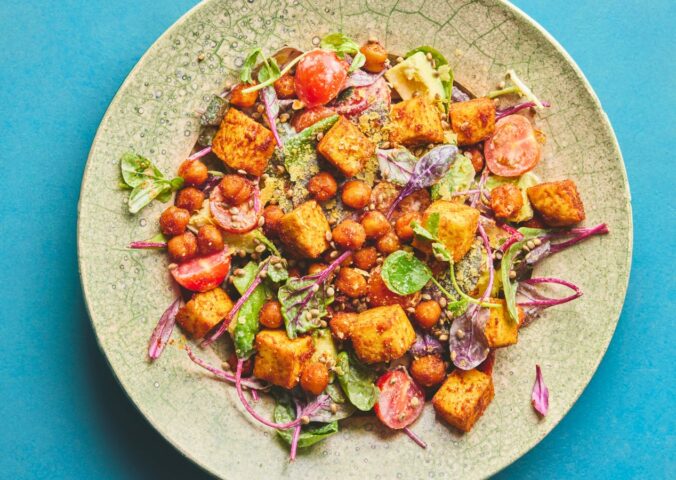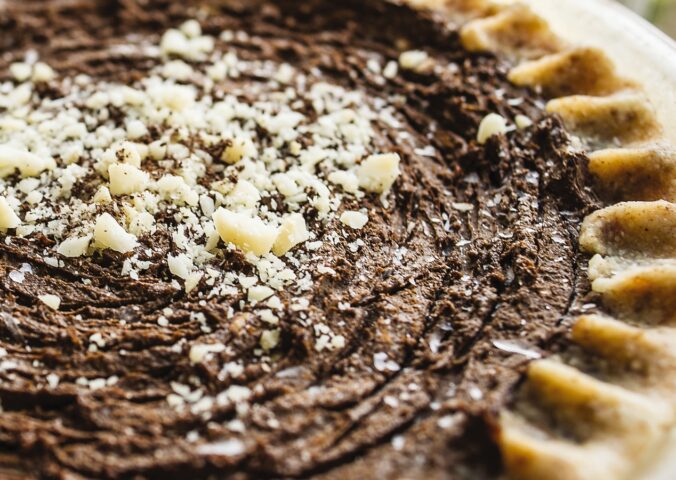Cooking and eating meals that contain plenty of “plant points” is just one way of emphasizing well-balanced and nutritionally-dense foods in your diet.
Plant points, also known as the “30 plant challenge,” place plant-based ingredients within a loose point system to track nutrient diversity throughout the week. While some people follow it precisely, it can also serve as a simple guide for embracing variety in your diet.
The plant points challenge encourages participants to eat 30 different fruits and vegetables over seven days, which studies indicate comes with certain health benefits. Whole grains, nuts, seeds, legumes, fruit, and vegetables all contribute to the week’s plant points, as do herbs, spices, vegetable stock, olive oil, and even tea and coffee.
Whole fruit and vegetables are worth a single point each, while herbs, spices, hot drinks, and other small additions are worth 0.25 points each. Colors also contribute, and eating different varieties of lentils, peppers, or nuts mean additional points for the weekly count.
Highly processed foods containing plant-based ingredients do not count towards the total, but nutrient-dense minimally processed foods like tofu do contribute. Diversity is key, and studies indicate that eating more than 10 portions of fruit and vegetables per day significantly reduces the risk of negative health outcomes and premature death.
Read more: Plant-Rich Diets Boost Gut Health, Study Finds
The rise of plant-based eating
A recent study conducted by The Vegan Society found that around two million people in the UK identify as plant-based. The most commonly cited reasons for people eschewing animal products include health, animal welfare, and the environment.
Speaking to Cosmopolitan about the benefits of plant points in 2023, Dr. Anojan Arulananthan – a medical doctor and Holland & Barrett’s retail health lead – noted that 30 plants per week might sound “daunting,” but that servings can be a modest 80g.
“The idea is to mix up the plant foods during the week, in varying amounts, selecting from whole grains, fruits, vegetables, nuts, seeds, and legumes to provide the bacteria in your gut different types of plant foods to digest,” added Arulananthan.
Read more: The 11 Best Sources Of Plant-Based Calcium
10 vegan recipes to boost your plant points
These vegan recipes all feature diverse, plant-based ingredients that will contribute to your weekly quota of plant points (as well as your recommended daily allowance for fruit and vegetables). Add extra points by serving with a salad or tasty side dish.
Vegetable and chickpea traybake
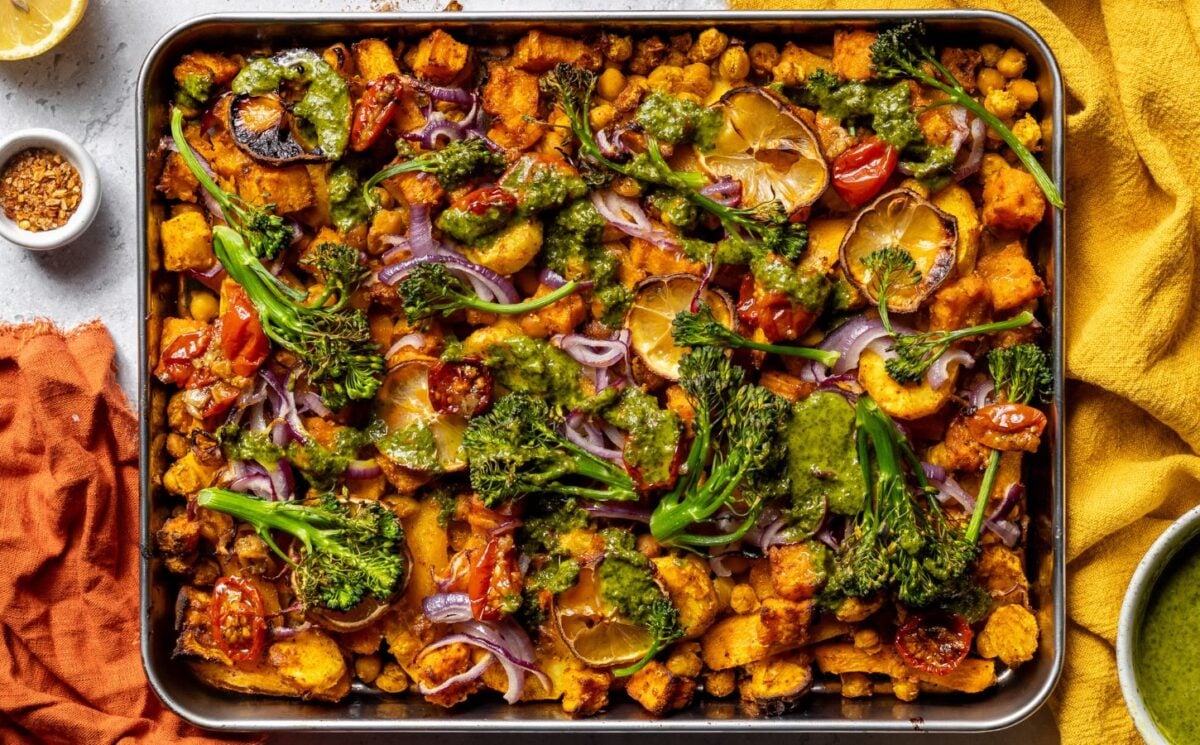
This vegan traybake from Romy London features seasonal winter vegetables like sweet potato, swede, and parsnips, alongside slow-roasted tomatoes, chickpeas, and broccoli. It’s chock full of plant points as well as protein and works well with carbs or leafy greens.
Find the recipe here.
Spinach, tomato, and tofu curry

This curry recipe features in the book High Protein Vegan by Rose Wyles. The sauce itself includes mostly blended spinach, and the protein comes from pressed firm tofu. Top with finely chopped fresh coriander leaves and serve over brown rice for extra fiber.
Find the recipe here.
Balsamic cabbage on harissa butter beans

Another recipe from Romy London, this dish features balsamic-coated, seared, and roasted cabbage served over harissa-flavored butter beans. The ingredients are extremely nutritious and affordable, while the completed final dish is absolutely packed with flavor.
Find the recipe here.
Smoky aubergine with tomato and chickpeas
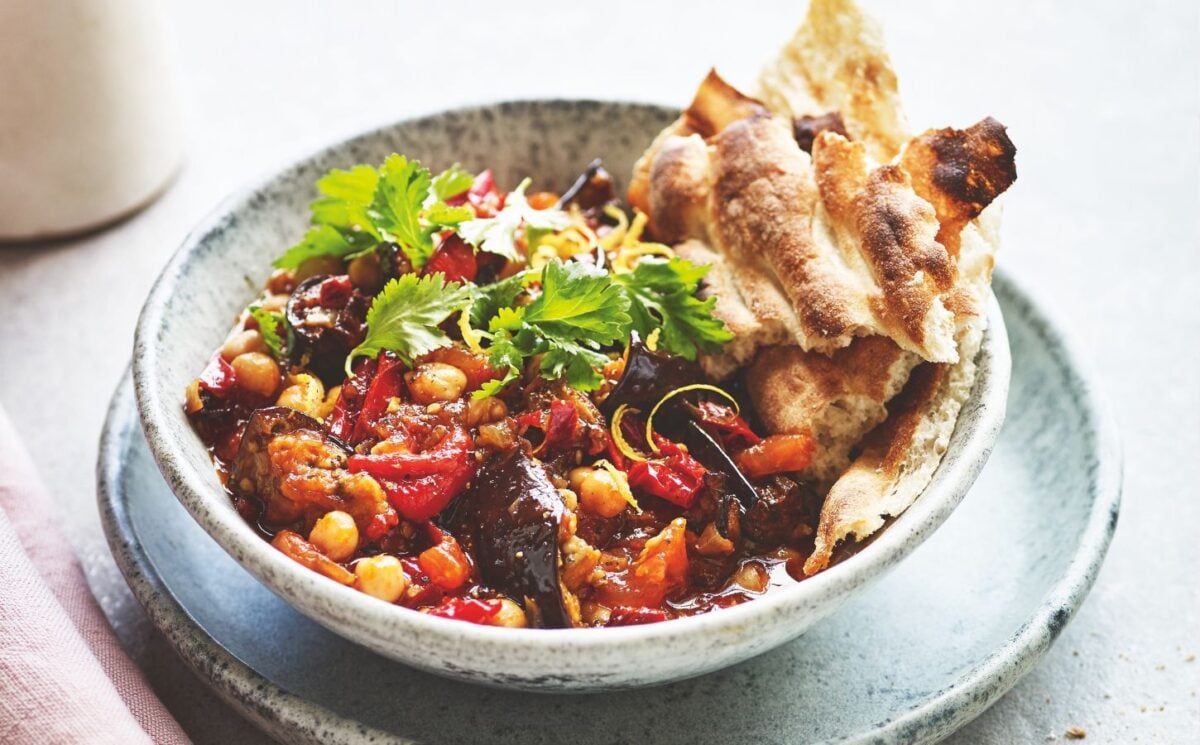
This recipe is published in Annie Rigg’s book Eat More Vegan and combines roasted aubergines with sweet tomatoes, chickpeas, and a smoky, spicy, chipotle chili sauce, perfect for winter. It can be paired with any carb of your choice and works well with fresh coriander.
Find the recipe here.
Green cannellini bean stew
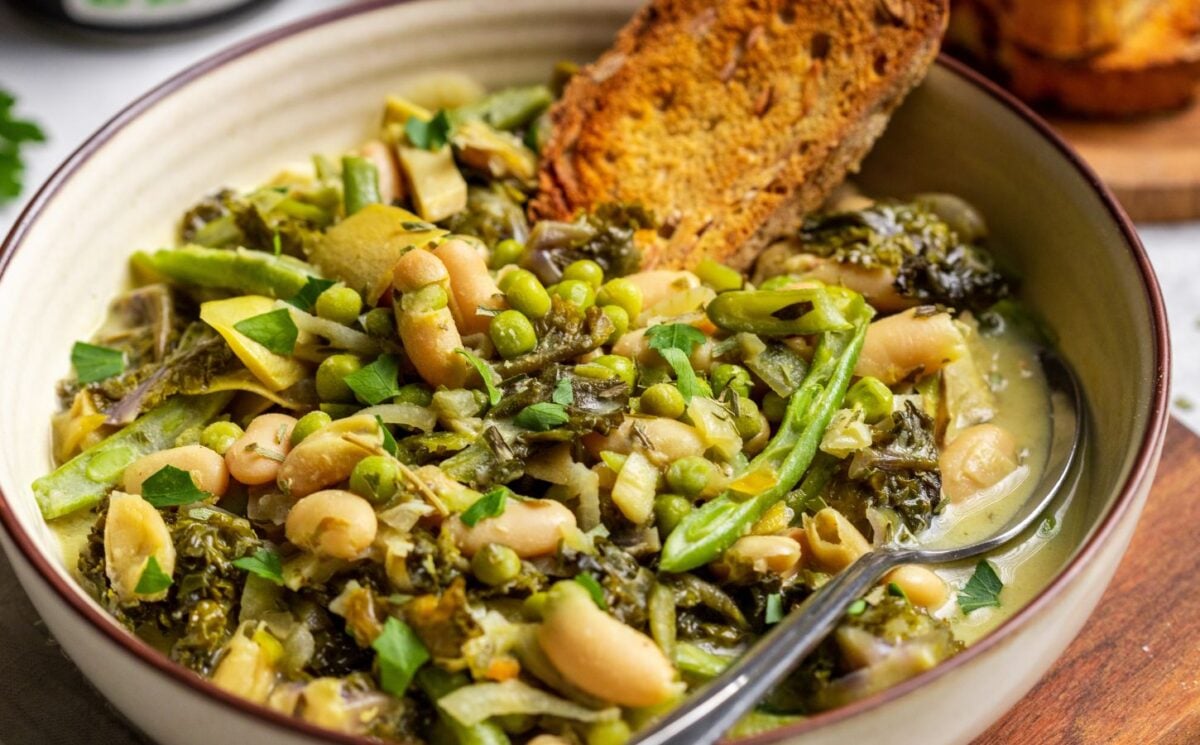
Romy London’s green cannellini bean stew is also perfect for the winter months – it’s full of protein (and plant points) and combines flavors from miso, dijon mustard, and vegetable stock with cannellini beans, peas, and artichokes. It takes just 15 minutes to prep.
Find the recipe here.
Tahini-roasted root veg with rice and lentils
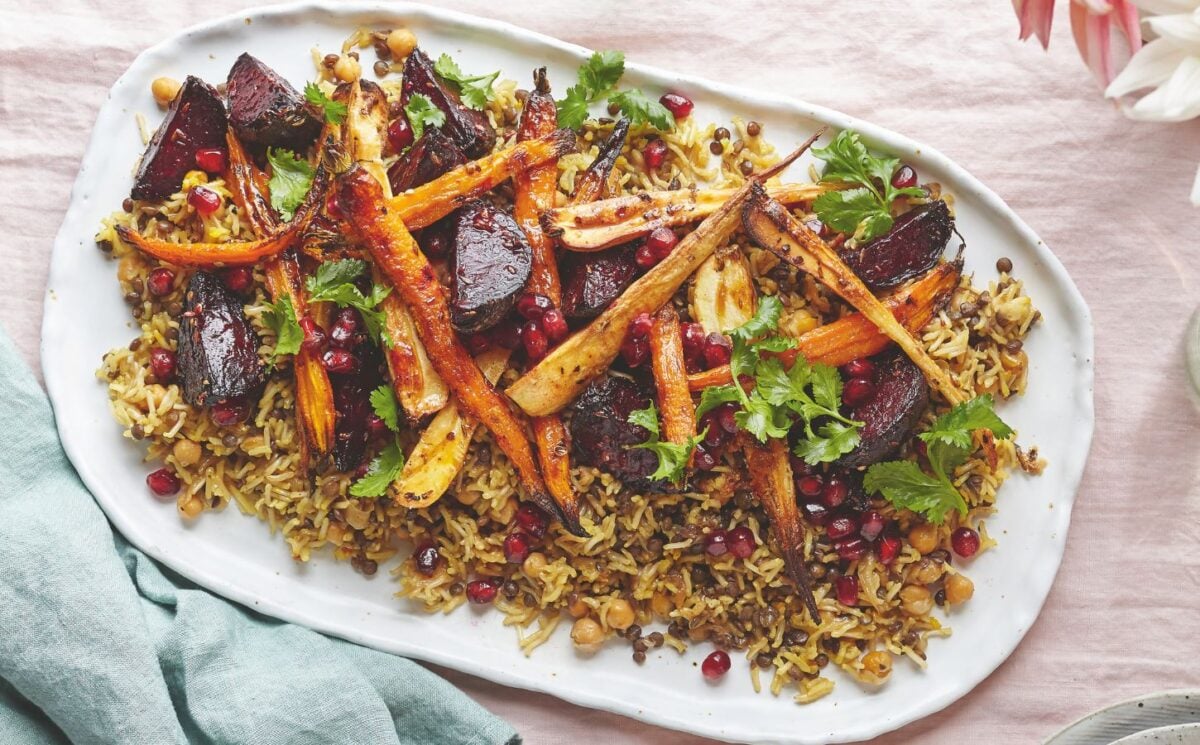
This recipe also comes from Annie Rigg and includes hearty and nutritious root vegetables like parsnips, carrots, and beets, seasoned with cumin, coriander, and Aleppo chili flakes. It also includes a chermoula dressing made by combining coriander, lemon, sumac, chili, garlic, and onion, with a blend of olive oil and other fragrant herbs and spices.
Find the recipe here.
Whole roasted miso cauliflower

This Romy London recipe also incorporates miso, as well as maple syrup, soy sauce, olive oil, and paprika powder to glaze a whole head of cauliflower for roasting. Cauliflower is a nutrient-dense and underrated vegetable that provides essential vitamins with a nutty flavor.
Find the recipe here.
Buffalo chickpeas with roasted sweet potatoes

Romy London combines the nutrient density of chickpeas with iconic buffalo flavors for this hearty, tangy, spicy, and buttery dish. Sweet potatoes are also packed with fiber and antioxidants, making them a perfect pairing for protein-rich chickpeas. Finish with a spoonful of vegan yogurt, fresh coriander, and a drizzle of balsamic glaze before serving.
Find the recipe here.
Creamy chickpea bowl
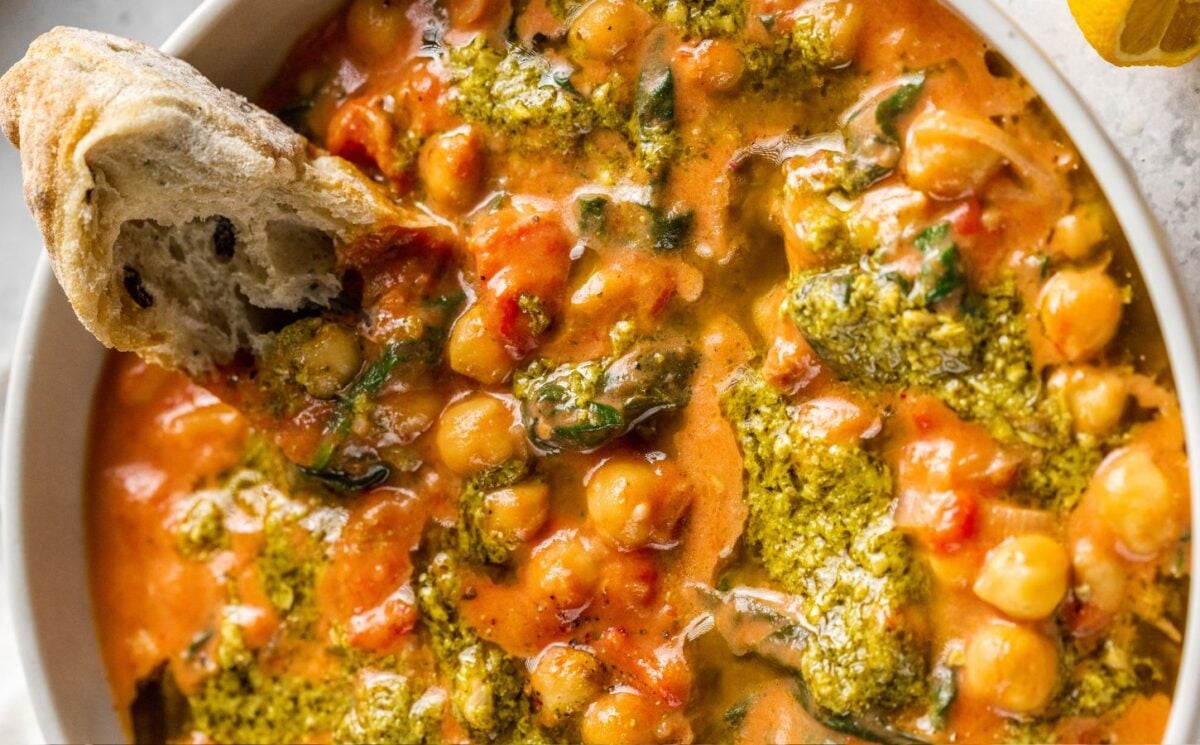
Another chickpea-based recipe, this one was also created by Romy London. It’s simple, nutritious, and flavorsome, and it takes just 10 minutes to prepare. Serve with toasted fresh bread or a side of mashed potatoes, and finish with a sprinkle of salt and pepper.
Find the recipe here.
Ikarian ‘longevity stew’
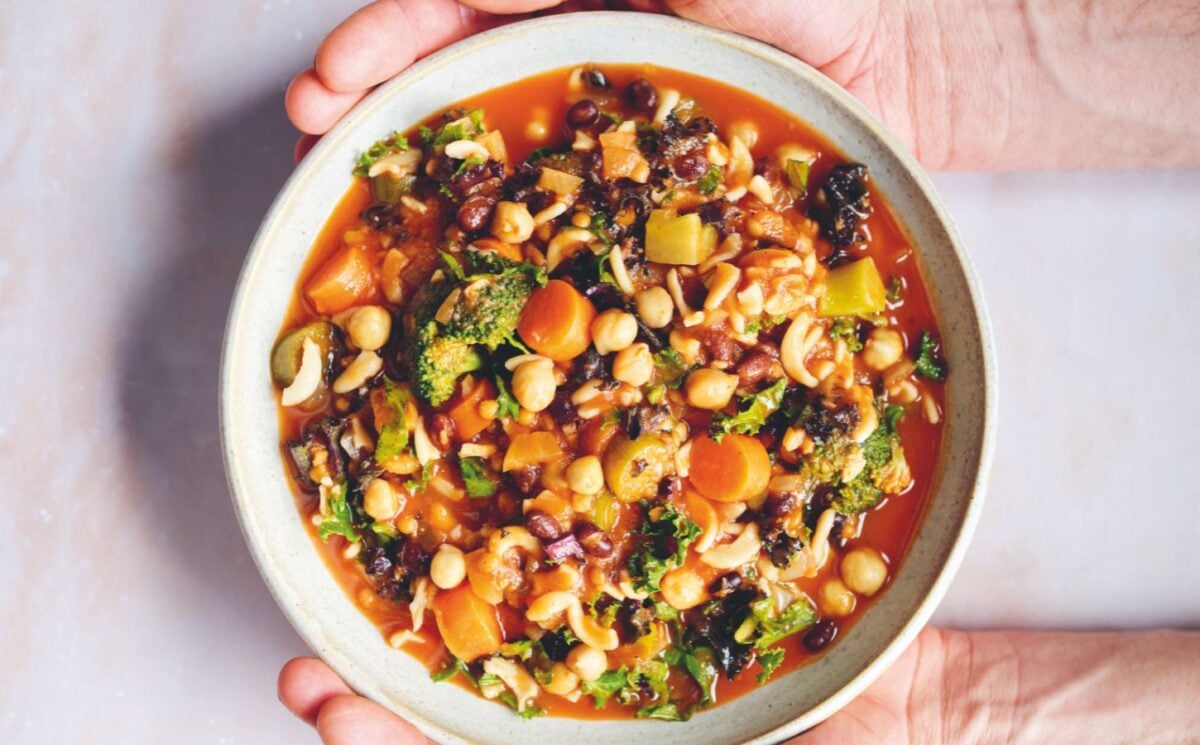
This recipe comes from David and Stephen Flynn, aka the Happy Pear Twins, and features in their most recent cookbook: The Happy Pear 20: Recipes and Learnings from the First 20 Years. The dish is inspired by the traditional diets of Ikaria, Greece, whose population is known for their long lifespans and lack of common chronic diseases.
This hearty ‘longevity stew’ from the Flynns is packed with nutrient-dense veggies like onions, garlic, carrots, leeks, broccoli, and kale, all of which count towards your weekly plant points. It also includes black beans, chickpeas, lentils, and wholemeal pasta. This mix of wholesome ingredients could make it one of the all-time essential plant points recipes.
Find the recipe here.


